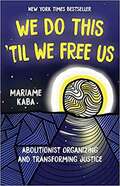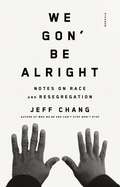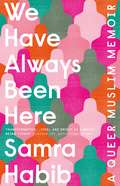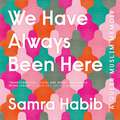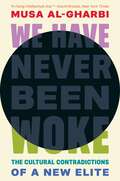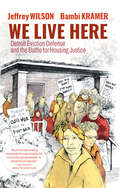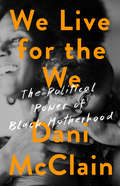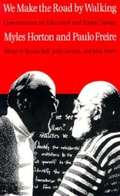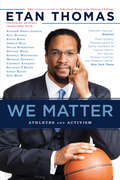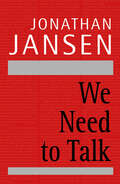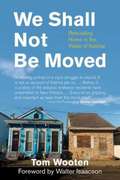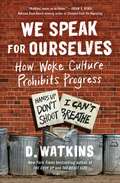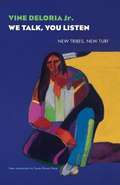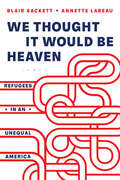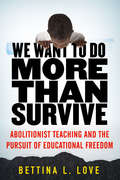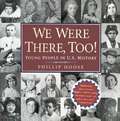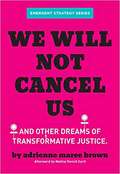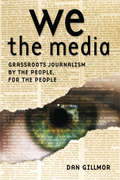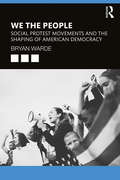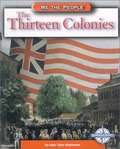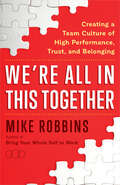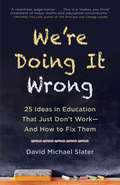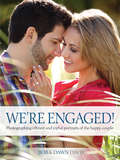- Table View
- List View
We Demand: The University and Student Protests
by Roderick A. FergusonThis title is part of American Studies Now and available as an e-book first. Visit ucpress.edu/go/americanstudiesnow to learn more. In the post–World War II period, students rebelled against the archaic university. In student-led movements, they fought for the new kinds of public the university needed to serve—women, minorities, immigrants, indigenous people, and more—with a success that had a profound impact on the intellectual landscape of the twentieth century. Because of their efforts, ethnic studies, women’s studies, and American studies were born, and minority communities have become more visible and important to academic debate. Less than fifty years since this pivotal shift in the academy, however, the university is fighting back. In We Demand, Roderick A. Ferguson shows how the university, particularly the public university, is moving away from “the people” in all their diversity. As more resources are put toward STEM education, humanities and interdisciplinary programs are being cut and shuttered. This has had a devastating effect on the pursuit of knowledge, and on interdisciplinary programs born from the hard work and effort of an earlier generation. This is not only a reactionary move against the social advances since the ’60s and ’70s, but part of the larger threat of anti-intellectualism in the United States.
We Do This 'til We Free Us: Abolitionist Organizing and Transforming Justice (Abolitionist Papers)
by Mariame Kaba Tamara K. Nopper Naomi MurakawaWhat if social transformation and liberation isn’t about waiting for someone else to come along and save us? What if ordinary people have the power to collectively free ourselves? In this timely collection of essays and interviews, Mariame Kaba reflects on the deep work of abolition and transformative political struggle. <p><p> With a foreword by Naomi Murakawa and chapters on seeking justice beyond the punishment system, transforming how we deal with harm and accountability, and finding hope in collective struggle for abolition, Kaba’s work is deeply rooted in the relentless belief that we can fundamentally change the world. As Kaba writes, “Nothing that we do that is worthwhile is done alone.”
We Gave Away a Fortune
by Christopher Mogil Anne Slepian Peter WoodrowStories of People Who Have Devoted Themselves and Their Wealth To Peace, Justice and a Healthy Environment
We Gon' Be Alright: Notes on Race and Resegregation
by Jeff ChangIn these provocative, powerful essays acclaimed writer/journalist Jeff Chang (Can’t Stop Won’t Stop, Who We Be) takes an incisive and wide-ranging look at the recent tragedies and widespread protests that have shaken the country. Through deep reporting with key activists and thinkers, passionately personal writing, and distinguished cultural criticism, this book links #BlackLivesMatter to #OscarsSoWhite, Ferguson to Washington D.C., the Great Migration to resurgent nativism. Chang explores the rise and fall of the idea of “diversity,” the roots of student protest, changing ideas about Asian Americanness, and the impact of a century of racial separation in housing. He argues that resegregation is the unexamined condition of our time, the undoing of which is key to moving the nation forward to racial justice and cultural equity.
We Have Always Been Here
by Samra HabibTriumphant and uplifting - a queer Muslim memoir about forgiveness and freedom.'Revolutionary' Mona Eltahawy * 'Exquisite, powerful and urgent' Stacey May Fowles * 'I fell in love with this book' Shani MootooA memoir of hope, faith and love, Samra Habib's story starts with growing up as part of a threatened minority sect in Pakistan, and follows her arrival in Canada as a refugee, before escaping an arranged marriage at sixteen. When she realized she was queer, it was yet another way she felt like an outsider. So begins a journey that takes her to the far reaches of the globe to uncover a truth that was within her all along. It shows how Muslims can embrace queer sexuality, and families can embrace change. A triumphant story of forgiveness and freedom, We Have Always Been Here is a rallying cry for anyone who has ever felt alone and a testament to the power of fearlessly inhabiting one's truest self.
We Have Always Been Here
by Samra HabibA powerful, uplifting queer Muslim memoir by a young Pakistani-Canadian activist and photographer.Triumphant and uplifting - a queer Muslim memoir about forgiveness and freedom.A memoir of hope, faith and love, Samra Habib's story starts with growing up as part of a threatened minority sect in Pakistan, and follows her arrival in Canada as a refugee, before escaping an arranged marriage at sixteen. When she realized she was queer, it was yet another way she felt like an outsider. So begins a journey that takes her to the far reaches of the globe to uncover a truth that was within her all along. It shows how Muslims can embrace queer sexuality, and families can embrace change. A triumphant story of forgiveness and freedom, We Have Always Been Here is a rallying cry for anyone who has ever felt alone and a testament to the power of fearlessly inhabiting one's truest self.(P) 2019 Quercus Editions Limited
We Have Never Been Woke: The Cultural Contradictions of a New Elite
by Musa al-GharbiHow a new &“woke&” elite uses the language of social justice to gain more power and status—without helping the marginalized and disadvantagedSociety has never been more egalitarian—in theory. Prejudice is taboo, and diversity is strongly valued. At the same time, social and economic inequality have exploded. In We Have Never Been Woke, Musa al-Gharbi argues that these trends are closely related, each tied to the rise of a new elite—the symbolic capitalists. In education, media, nonprofits, and beyond, members of this elite work primarily with words, ideas, images, and data, and are very likely to identify as allies of antiracist, feminist, LGBTQ, and other progressive causes. Their dominant ideology is &“wokeness&” and, while their commitment to equality is sincere, they actively benefit from and perpetuate the inequalities they decry. Indeed, their egalitarian credentials help them gain more power and status, often at the expense of the marginalized and disadvantaged.We Have Never Been Woke details how the language of social justice is increasingly used to justify this elite—and to portray the losers in the knowledge economy as deserving their lot because they think or say the &“wrong&” things about race, gender, and sexuality. Al-Gharbi&’s point is not to accuse symbolic capitalists of hypocrisy or cynicism. Rather, he examines how their genuine beliefs prevent them from recognizing how they contribute to social problems—or how their actions regularly provoke backlash against the social justice causes they champion.A powerful critique, We Have Never Been Woke reveals that only by challenging this elite&’s self-serving narratives can we hope to address social and economic inequality effectively.
We Live Here: Detroit Eviction Defense and the Battle for Housing Justice
by Jeffrey Wilson Bambi KramerA graphic novel featuring uplifting stories of combatting—and beating—calls for their eviction in Detroit, showing how everyday people are fighting to stay in their homes, organizing with their communities, and winning.We Live Here! is a graphic novel biography of the members of the local activist group Detroit Eviction Defense combatting—and beating—calls for their eviction. By illustrating the stories of families struggling against evictions, the book gives a voice to those who have remained in Detroit, showing the larger complexities at work in a beleaguered city. These are everyday people fighting back, organizing with others, going into the streets, and winning their homes back. What will Detroit look like in the future? Today cheap property entices real estate speculators from around the world. Artists arrive from all over viewing the city as a creative playground. Billionaires are re-sculpting downtown as a spot for tourism. But beyond the conventional players in urban growth and development, Detroit Eviction Defense (DED) members—like others engaged in place-based struggles all over the country—are pushing back, saying in effect, &“we live here, we&’ve been here, there is no Detroit without us.&”
We Live for the We: The Political Power of Black Motherhood
by Dani McClainA warm, wise, and urgent guide to parenting in uncertain times, from a longtime reporter on race, reproductive health, and politicsIn We Live for the We, first-time mother Dani McClain sets out to understand how to raise her daughter in what she, as a black woman, knows to be an unjust--even hostile--society. Black women are more likely to die during pregnancy or birth than any other race; black mothers must stand before television cameras telling the world that their slain children were human beings. What, then, is the best way to keep fear at bay and raise a child so she lives with dignity and joy?McClain spoke with mothers on the frontlines of movements for social, political, and cultural change who are grappling with the same questions. Following a child's development from infancy to the teenage years, We Live for the We touches on everything from the importance of creativity to building a mutually supportive community to navigating one's relationship with power and authority. It is an essential handbook to help us imagine the society we build for the next generation.
We Make the Road by Walking: Conversations on Education and Social Change
by Myles Horton Paulo Freire Brenda Bell John Gaventa John PetersIn December 1987, Myles Horton and Paulo Freire, two pioneers of education for social change, came together to "talk a book" about their experiences and ideas. Though they came from different environments--one from the rural mountains of Appalachia, the other from São Paulo, the largest industrial city in Brazil--Myles and Paulo shared a vision and a history of using participatory education as a crucible for empowerment of the poor and powerless.
We Matter: Athletes and Activism
by Etan ThomasInterviews with sports stars, activists, surviving family members, and others fighting racial injustice: &“Before Kaepernick, there was Etan Thomas.&”—The New York TimesA Library Journal Best Book of the YearProfessional athletes have long been influential figures in American life. Today, many of them are using their platforms to speak up about injustice and inequality. This book features interviews by former NBA player Etan Thomas with over fifty athletes, executives, media figures, and more—interwoven with essays and critiques by Thomas.Includes personal stories and opinions from:Kareem Abdul-Jabbar, Bill Russell, Dwyane Wade, Russell Westbrook, Steve Kerr, Oscar Robertson, Mark Cuban, Michael Bennett, Carmelo Anthony, Derrick Rose, Swin Cash, Alonzo Mourning, Chris Webber, Jemele Hill, Anquan Boldin, Jamal Crawford, Juwan Howard, Ray Jackson, Shannon Sharpe, James Blake, John Carlos, Laila Ali, Michael Eric Dyson, Joakim Noah, Eric Reid, Adam Silver, Soledad O'Brien, John Wall, Mahmoud Abdul-Rauf, Bradley Beal, Tamika Catchings, Curtis Conway, Harry Edwards, Chris Hayes, Chamique Holdsclaw, Scoop Jackson, Bomani Johnes, Shaun King, Jimmy King, Ted Leonsis, Thabo Sefolosha, Ilyasah Shabazz, Torrey Smith, Kenny Smith, Michael Smith, David West, Michael Wilbon, Jahvaris Fulton (brother of Trayvon Martin), Emerald Snipes (daughter of Eric Garner), Allysza Castile (sister of Philando Castile), Valerie Castile (mother of Philando Castile), and Dr. Tiffany Crutcher (sister of Terence Crutcher)&“In We Matter, Thomas strives to show the influence professional athletes can have when they join the conversation on race, politics, and civil rights. Thomas conducted 50 interviews, which included Kareem Abdul-Jabbar, Bill Russell, Laila Ali, Michael Bennett, and Eric Reid, among many other athletes, as well as journalists, television personalities, and family members of unarmed black men who were shot and killed. Thomas also explored his ties with the Wizards and spoke with John Wall, Bradley Beal, and current majority team owner Ted Leonsis.&”—TheWashington Post&“The honest conversations, published in transcript form and often accompanied by black-and-white photos, serve as a primer on recent police violence cases, a history lesson on the first athletes who stood up for racial injustice, an examination of the experience of being young and black in the United States, and an insightful look at how it feels to lose a loved one to tragedy, from contributors such as Jemele Hill, Kareem Abdul-Jabbar, and Carmelo Anthony...An important read, executed uniquely.&”—School Library Journal (starred review) &“Voices of pain, anger, and hope resound through these pages--and through the reader's heart.&”—Kirkus Reviews
We Shall Not Be Moved
by Tom Wooten“It was heartbreaking, but we couldn’t give up. I just said, ‘Well, I’ve got to get in and do it. ’”—Phil Harris, eight-decade-long resident of Hollygrove As floodwaters drained in the weeks following Hurricane Katrina, New Orleans residents came to a difficult realization. Their city was about to undertake the largest disaster recovery in American history, yet they faced a profound leadership vacuum: members of every tier of government, from the municipal to the federal level, had fallen down on the job. We Shall Not Be Movedtells the absorbing story of the community leaders who stepped into this void to rebuild the city they loved. From a Vietnamese Catholic priest who immediately knows when two of his six thousand parishioners go missing to a single mother from the Lower Ninth Ward who instructs the likes of Jimmy Carter and Brad Pitt, these intrepid local organizers show that a city’s fate rests on the backs of its citizens. On their watch, New Orleans neighborhoods become small governments. These leaders organize their neighbors to ward off demolition threats, write comprehensive recovery plans, found community schools, open volunteer centers, raise funds to rebuild fire stations and libraries, and convince tens of thousands of skeptical residents to return home. Focusing on recovery efforts in five New Orleans neighborhoods—Broadmoor, Hollygrove, Lakeview, the Lower Ninth Ward, and Village de l’Est—Tom Wooten presents vivid narratives through the eyes and voices of residents rebuilding their homes, telling a story of resilience as entertaining as it is instructive. The unprecedented community mobilization underway in New Orleans is a silver lining of Hurricane Katrina’s legacy. By shedding light on this rebirth,We Shall Not Be Movedshows how residents, remarkably, turned a profound national failure into a story of hope. From the Hardcover edition.
We Speak for Ourselves: A Word from Forgotten Black America
by D. WatkinsFrom the row houses of Baltimore to the stoops of Brooklyn, with searing conviction and full compassion, D. Watkins, New York Times bestselling author of The Cook Up and The Beast Side lays bare the voices of the most vulnerable and allows their raw, intimate stories to uncover the systematic injustice threaded within our society. Honest and eye-opening, We Speak for Ourselves makes us listen, feel, and create a course toward change that starts right where we are.Watkins introduces you to Down Bottom, the storied community of East Baltimore that holds a mirror to America’s poor black neighborhoods—“hoods” that could just as easily be in Chicago, Detroit, Oakland, or Atlanta. As Watkins sees it, the perspective of people who live in economically disadvantaged black communities is largely absent from the commentary of many top intellectuals who speak and write about race. Unapologetic and sharp-witted, D. Watkins is here to tell the truth as he has seen it. We Speak for Ourselves offers an in-depth analysis of inner-city hurdles and honors the stories therein. We sit in underfunded schools, walk the blocks burdened with police corruption, stand within an audience of Make America Great Again hats, journey from trap house to university lecture, and rally in neglected streets. And we listen. Watkins shares the lessons he has learned while navigating through two very distinct worlds—the hood and the elite sanctums of prominent black thinkers and public figures—serving hope to fellow Americans who are too often ignored and calling on others to examine what it means to be a model activist in today’s world. We Speak for Ourselves is a must-read for all who are committed to social change.
We Talk, You Listen: New Tribes, New Turf
by Vine Deloria Jr."We Talk, You Listen" is strong, boldly unconventional medicine from Vine Deloria Jr., one of the most important voices of twentieth-century Native American affairs. He turns his penetrating vision toward the disintegrating core of American society. Written at a time when the traditions of the formerly omnipotent Anglo-Saxon male were crumbling under the pressures of a changing world, Deloria's book interprets racial conflict, inflation, the ecological crisis, and power groups as symptoms rather than causes of the American malaise: "The glittering generalities and mythologies of American society no longer satisfy the need and desire to belong", a theory as applicable today as it was in 1970. American Indian tribalism, according to Deloria, was positioned to act as America's salvation. Deloria proposes a uniquely Indian solution to the legacy of genocide, imperialism, capitalism, feudalism, and self-defeating liberalism: group identity and real community development, a kind of neo-tribalism. He also offers a fascinating cultural critique of the nascent "tribes" of the 1970s, indicting Chicanos, blacks, hippies, feminists, and others as misguided because they lacked comprehensive strategies and were led by stereotypes rather than an understanding of their uniqueness.
We Thought It Would Be Heaven: Refugees in an Unequal America
by Annette Lareau Blair SackettResettled refugees in America face a land of daunting obstacles where small things—one person, one encounter—can make all the difference in getting ahead or falling behind. Fleeing war and violence, many refugees dream that moving to the United States will be like going to Heaven. Instead, they enter a deeply unequal American society, often at the bottom. Through the lived experiences of families resettled from the Democratic Republic of the Congo, Blair Sackett and Annette Lareau reveal how a daunting obstacle course of agencies and services can drastically alter refugees’ experiences building a new life in America. In these stories of struggle and hope, as one volunteer said, "you see the American story." For some families, minor mistakes create catastrophes—food stamps cut off, educational opportunities missed, benefits lost. Other families, with the help of volunteers and social supports, escape these traps and take steps toward reaching their dreams. Engaging and eye-opening, We Thought It Would Be Heaven brings readers into the daily lives of Congolese refugees and offers guidance for how activists, workers, and policymakers can help refugee families thrive.
We Want to Do More Than Survive: Abolitionist Teaching and the Pursuit of Educational Freedom
by Bettina LoveDrawing on personal stories, research, and historical events, an esteemed educator offers a vision of educational justice inspired by the rebellious spirit and methods of abolitionists.Drawing on her life's work of teaching and researching in urban schools, Bettina Love persuasively argues that educators must teach students about racial violence, oppression, and how to make sustainable change in their communities through radical civic initiatives and movements. She argues that the US educational system is maintained by and profits from the suffering of children of color. Instead of trying to repair a flawed system, educational reformers offer survival tactics in the forms of test-taking skills, acronyms, grit labs, and character education, which Love calls the educational survival complex. To dismantle the educational survival complex and to achieve educational freedom--not merely reform--teachers, parents, and community leaders must approach education with the imagination, determination, boldness, and urgency of an abolitionist. Following in the tradition of activists like Ella Baker, Bayard Rustin, and Fannie Lou Hamer, We Want to Do More Than Survive introduces an alternative to traditional modes of educational reform and expands our ideas of civic engagement and intersectional justice.
We Were There,Too!: Young People in US History
by Phillip HooseBiographies of dozens of young people who made a mark in American history, including explorers, planters, spies, cowpunchers, sweatshop workers, and civil rights workers.
We Will Not Cancel Us: Breaking The Cycle Of Harm (Emergent Strategy Series)
by Adrienne Maree Brown Malkia Devich-CyrilCancel culture addresses real harm...and sometimes causes more. It’s time to think this through. <P><P> “Cancel” or “call-out” culture is a source of much tension and debate in American society. The infamous "Harper’s Letter,” signed by public intellectuals of both the left and right, sought to settle the matter and only caused greater division. Originating as a way for marginalized and disempowered people to address harm and take down powerful abusers, often with the help of social media, call outs are seen by some as having gone too far. But what is “too far” when you’re talking about imbalances of power and patterns of harm? And what happens when people in social justice movements direct their righteous anger inward at one another? <P><P> In We Will Not Cancel Us, movement mediator adrienne maree brown reframes the discussion for us, in a way that points to possible paths beyond this impasse. Most critiques of cancel culture come from outside the milieus that produce it, sometimes even from from its targets. However, brown explores the question from a Black, queer, and feminist viewpoint that gently asks, <i> how well does this practice serve us? Does it prefigure the sort of world we want to live in? And, if it doesn’t, how do we seek accountability and redress for harm in ways that reflect our values?</i> <P><P> With an Afterword by Malkia Devich-Cyril.
We the Media: Grassroots Journalism By the People, For the People
by Dan Gillmor"We the Media, has become something of a bible for those who believe the online medium will change journalism for the better." -Financial Times Big Media has lost its monopoly on the news, thanks to the Internet. Now that it's possible to publish in real time to a worldwide audience, a new breed of grassroots journalists are taking the news into their own hands. Armed with laptops, cell phones, and digital cameras, these readers-turned-reporters are transforming the news from a lecture into a conversation. In We the Media, nationally acclaimed newspaper columnist and blogger Dan Gillmor tells the story of this emerging phenomenon and sheds light on this deep shift in how we make--and consume--the news. Gillmor shows how anyone can produce the news, using personal blogs, Internet chat groups, email, and a host of other tools. He sends a wake-up call tonewsmakers-politicians, business executives, celebrities-and the marketers and PR flacks who promote them. He explains how to successfully play by the rules of this new era and shift from "control" to "engagement." And he makes a strong case to his fell journalists that, in the face of a plethora of Internet-fueled news vehicles, they must change or become irrelevant. Journalism in the 21st century will be fundamentally different from the Big Media oligarchy that prevails today. We the Media casts light on the future of journalism, and invites us all to be part of it. Dan Gillmor is founder of Grassroots Media Inc., a project aimed at enabling grassroots journalism and expanding its reach. The company's first launch is Bayosphere.com, a site "of, by, and for the San Francisco Bay Area." Dan Gillmor is the founder of the Center for Citizen Media, a project to enable and expand reach of grassroots media. From 1994-2004, Gillmor was a columnist at the San Jose Mercury News, Silicon Valley's daily newspaper, and wrote a weblog for SiliconValley.com. He joined the Mercury News after six years with the Detroit Free Press. Before that, he was with the Kansas City Times and several newspapers in Vermont. He has won or shared in several regional and national journalism awards. Before becoming a journalist he played music professionally for seven years.
We the People: Social Protests Movements and the Shaping of American Democracy
by Bryan WardeWe the People: Social Protest Movements and the Shaping of American Democracy uses a historical and a contemporary focus to demonstrate the integral role that social protest movements play in challenging social and structural inequality along the intersecting axis of identity politics, socioeconomic status and ability, and why social protest movements should matter to social workers.The book examines how social protest movements influence progressive social policy and elucidates the social conditions that give rise to protest, how protest creates social movements, and the functions and goals of social protest movements. By exploring various theoretical perspectives, it brings both a historical and a contemporary lens to the examination of social protest movements and elucidates the critical role that social protest movements play in American democracy.With a discussion of emerging trends and the future of social protest movements, We the People explains and offers strategies for both students and social workers to develop the skills to think critically and take part in social protest movements as policy practitioners.
We the People: The Thirteen Colonies
by Marc Tyler NoblemanIntroduces the European immigrants who came to North America as explorers and settlers, their interactions with native people, and the wars that ultimately led to their independence.
We're All in This Together: Creating a Team Culture of High Performance, Trust, and Belonging
by Mike RobbinsWhat makes a great team? Author, leadership expert, and corporate consultant looks at how businesses can build trust and achieve high performance.Have you ever been on a team where the talent was strong, but the team wasn't very good? On the flip side, have you ever been on a team where not every single member was a rock star, but something about the team just worked?We've all had these types of experiences. And yet, it can be difficult to understand what makes one team successful and another one not.In this book, Mike Robbins dives deep into the ways great businesses build trust, collaborate, and operate at their peak level. As an expert in teamwork, leadership, and emotional intelligence, Mike draws on more than 20 years of experience working with top companies like Google and Microsoft, as well as his baseball career with the Kansas City Royals. And, while each team and organization have their own unique challenges, goals, and dynamics, there are some universal qualities that allow teams to truly come together and thrive.The book's core principles include fostering an environment of psychological safety, fostering inclusion and belonging, addressing and navigating conflict, and maintaining a healthy balance of high expectations and empathy. Throughout, Mike shares powerful exercises and tools he's successfully utilized in the keynote speeches, group sessions and corporate retreats that he delivers, so that you and your team can communicate more authentically, give and receive feedback with skill, and create deeper connections.We're All in This Together also features personal stories and interviews with high-level business leaders and thought leaders to provide insights into an ever-changing workplace culture. ***"For us to do our best work, have the kind of impact we truly want to have, and unlock our full potential, we can't do it alone; we must to do it together. If you and your team are willing to do what it takes, you can build and sustain an incredibly strong culture of trust and performance, and accomplish remarkable things." -Mike Robbins
We're Doing It Wrong: 25 Ideas in Education That Just Don't Work—And How to Fix Them
by David Michael SlaterAn unapologetic critique of major flaws in the American education system. David Michael Slater’s We’re Doing It Wrong is a thought-provoking dissection of the issues plaguing American public schools. Each chapter identifies a major problem in the education system, exploring its roots and repercussions. A teacher himself, Slater opens up and gives readers an insider’s perspective on topics that have been at the center of ongoing debates as well as recent hot button issues, such as: • Standardized testing • Teacher evaluation practices • Helicopter parents • Class size • Poverty’s effect on performance • Anti-bullying programs • Writing proficiency • Curriculum goals Slater explains why our current approaches simply aren’t working—for students, for teachers, for the colleges that these students may eventually attend, and for society at-large. Unafraid to ruffle a few feathers, We’re Doing It Wrong highlights defects in policy and theory, calls out administration, and questions long-held beliefs. Every chapter concludes with a suggestion for improvement, offering light at the end of the tunnel. Administrators, teachers, and concerned parents will come away with a better understanding of the current state of education and ideas for moving toward progress—for themselves and for the students they support.
We're Engaged!
by Bob Dawn DavisToday’s brides- and grooms-to-be have grown up inundated by world-class photography on the Internet, television, magazines, and social networking sites. Therefore, it’s no surprise that these savvy, image-conscious consumers have high expectations when commissioning their engagement portraits. They want unique, innovative images that make them look great and reflect their personal style as individuals and as a couple. In this book, acclaimed photographers Bob and Dawn Davis show you how to rise to that lofty goal and deliver memorable, personalized images from each session. Covering the process from start to finish, you’ll learn how to select locations, work with clients on their styling, get great poses even from camera-shy subjects, and find (or create) amazing lighting indoors and out#151;all day long. Lighting diagrams paired with each final image selection, along with supporting image variations from the same session, make it easy to learn!

